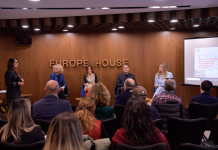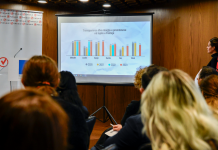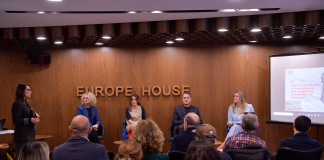Tirana, September 26, 2023 – The “Faktoje” Center presented at a conference the findings of the research “Gender-Based Misinformation in Albania: How the media shape attitudes towards gender roles”. Journalists, experts and activists in the field of media and human rights discussed the impact of gender-based disinformation campaigns on the media landscape in Albania. The findings of the study are divided into 4 main pillars, disinformation as a phenomenon, that about women in politics and activists, disinformation about marginalized communities and narratives that can be used by foreign actors for malicious purposes.
Disinformation campaigns mainly target women in politics and activists, but also marginalized groups such as LGBT+ through sexist attitudes, putting them before a public ‘trial’. This is one of the findings of the study “Gender-based disinformation in Albania: How the media shape attitudes towards gender roles”, carried out by the “Faktoje” center.
The research findings were presented this Tuesday at a conference dedicated to gender-based disinformation in Albania. The event brought together journalists, civil society representatives, human rights activists and the Commissioner for Protection from Discrimination.
“Faktoje for the first time this year undertook the work to see how gender disinformation affected certain groups, such as women in politics, the LGBTI community, or women activists who take on key positions in institutions, but on the other hand how women are defined in the community and became part of the news because of violence, or murders. And what we saw from the study was that gender-based disinformation in Albania affects some key elements and operates in a covert manner, making women lose their activism or political life.” , said at the opening of the conference, the executive director of Faktoje Klodiana Kapo.
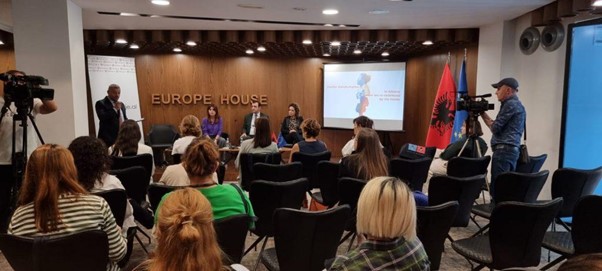
At the center of the research was the marking of the media landscape in Albania by gender-based disinformation campaigns. The fragile climate created by low-quality and manipulative reporting, according to this study, discourages women from active participation in politics and public life in general.
“These campaigns can be used by third foreign actors to increase distrust towards the EU or Western values in general. The structure of the Albanian media ecosystem, especially the mix of media and political interests, means that the Albanian media is vulnerable to foreign misinformation with malicious and destabilizing purposes. The potential of malicious foreign interventions and influence increases even more if you consider that about 900 portals, most of them ghost, are ready to turn into mercenaries of disinformation to secure funding,” Viola emphasized during the presentation of the main findings of the study. This is the editor-in-chief of the Faktoje Center.
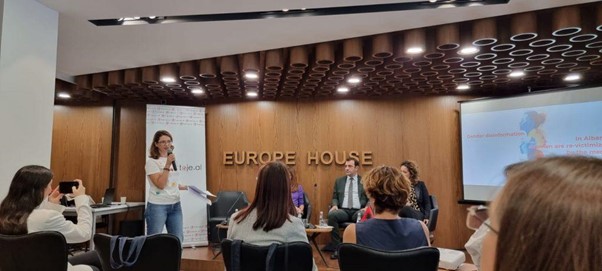
The findings of the study “Gender-based misinformation in Albania; How the media shape attitudes towards gender roles” are illustrated with stories of politicians, activists, members of the LGBT community, but also minors who have been victims of disinformation campaigns.
In the speech delivered on this occasion, Commissioner for Protection from Discrimination Robert Gajda, raised as a concern the lack of enforcement of the law against disinformation and hate speech in Albania.
“Disinformation and hate speech are closely related and feed off each other. There is one drawback: Commenters should be prosecuted. We have a legal basis, but we do not have any criminal prosecution. And currently, we don’t have the slightest deviation in this direction, while Europe has made steps forward. In Europe, people are prosecuted when they comment inciting hate speech”, said Gajda, as he brought as an example of failure the cases when targeted groups also target each other.
“We feel we have failed as an institution when one social group attacks another social group,” he said.
Edlira Çepani, expert on gender equality, emphasizes that in Albania, in addition to direct disinformation based on gender, there is also a type of hidden disinformation.
“This type of disinformation is related to the reinforcement of gender stereotypes. The media portrays women and girls as victims. There is also a desire to objectify girls and women to sell products, reinforcing gender stereotypes,” said Çepani.
During the conference, the Faktoje team also presented 5 fact-checking articles that refute/expose disinformation campaigns and illustrate the impact they have on the public by creating wrong perceptions through sexist, misogynistic and homophobic narratives.
The cases that were selected by Faktoje to be verified were also followed by the institution of the Commissioner for Protection from Discrimination.

